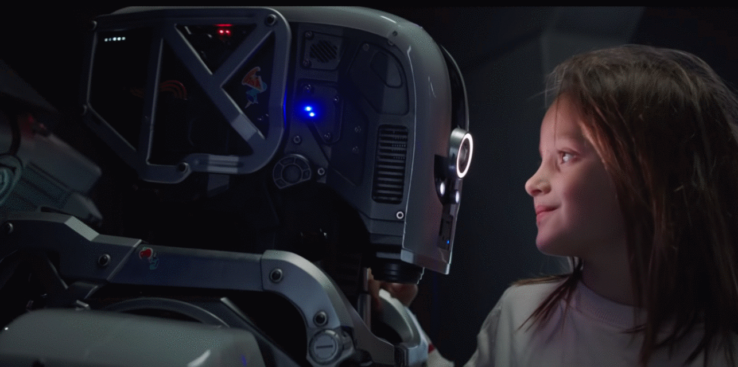My movie score: 4 (out of 5) IMDB: 6.8
Science Fiction movies aren’t known for dealing with subjects such as parenting. Vast expanses of space and the claustrophobic enclosures of spacecrafts don’t exactly lend themselves to discussions of attachment theory. So the new Netflix movie “I Am Mother” might be the first to do just that.
Earth has gone through an unspecified catastrophe that killed humanity. “Mother” is a robot that takes care of a human child, the only inhabitants of an isolated, hermetically closed base (unless your count thousands of frozen human embryos waiting for their turn to repopulate Earth). Leaving the base is dangerous and is strictly forbidden by Mother. Mother doesn’t look like a human. It has 2 diodes for eyes, its “face” lacking any human emotion. Frankly, it’s hard to swallow the idea that a child can grow up and develop normally without a caregiver the can show the full range of human emotion on its face. But it turns out, that what Mother lacks in facial mimicry and human touch, it compensates through her parenting software. In many ways she is the perfect mother – soft-spoken, understanding, patient, never tired, her responses always tuned in to the situation. Unlike its appearance, its voice is compassionate and loving and Daughter develops a strong attachment to Mother.
Years pass, Daughter grows into a happy, well-adjusted teenager (which is quite a fit for someone who spent 15 years of her life on a closed-off site with a robot for a company). Mother isn’t omnipresent – it doesn’t have a direct interface with the base, and so Daughter has a bit of privacy. One day a woman banging on the doors on the airlock, begging to let her in. Confused and curious, Daughter opens the sealed doors. Learning that Mother has lied to her, she begins on a path of teenage rebellion.
Even though “I am Mother” has the look and feel of a typical claustrophobic space horror, parents will probably be its most grateful and appreciative audience, far more than your typical sci-fi viewers. Instead of offering another tale of human survival in a claustrophobic setting, the movie has a more ambitious goal. It wants to tell us what it takes to become a good parent. Compassion, flexibility, self-sacrifice are not enough. To become a great parent for your kids, you need to kill, at least symbolically, your own parents. You need to distance yourself from the expectations, the emotional baggage and the automatic scripts that your parents planted in you. You need to become your own person, before you can raise a whole new person.
Don’t get me wrong – this isn’t a cerebral meditation on limits of AI and the challenges of parenthood. The movie has plenty of scars and thrills along the way. But when the end credits roll, you realize that unlike many other sci-fi movies that are quickly forgotten, this one will stick in your mind.



lwd35s